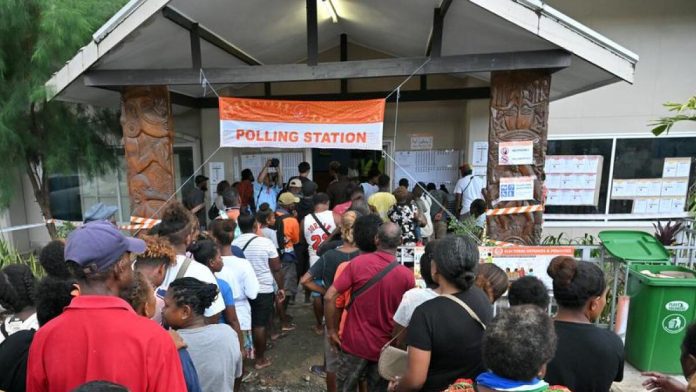Ballots are due to be cast in one of the Pacific’s largest elections as Solomon Islanders, from the city to remote villages, choose their next national leaders.
About 350,000 people are due to vote across 50 seats on Wednesday, a nationwide public holiday.
For the first time, the national vote also coincides with elections for eight of the 10 local governments.
Families on a boat with umbrellas
With early voting open to a select few, voters have spent recent days travelling back to home electorates, quietening the capital Honiara and forcing the nation’s main hospital to enter crisis mode due to a lack of staff.
More than 1000 polling stations are scattered across villages and town centres across the island nation northeast of Cairns.
Prime Minister Manasseh Sogavare, regarded for his political acumen but criticised for backsliding on democracy, has asked voters to back his economic plans against a backdrop of closer ties with China.
His term in power, which is his fourth and longest stint in the top office, has been controversial for switching diplomatic ties from Taiwan without parliamentary approval, and overseeing a 28-month COVID-19 state of emergency.
But Sogavare points to China’s gift of a $100 million (US$13.8 million) sporting complex and similarly-sized loan to build a Huawei-led national broadband network as examples of why the deal is right for the developing country.
Opposition figures, meanwhile, have campaigned on re-examining elements of the Chinese relationship including a 2022 security pact.
Domestic issues, including health services and the rising cost of living, have also played key roles in the campaigns.
Fiona Tafea travelled two hours by boat on Tuesday to support her sister Irene Vaukei’s independent campaign in the Nggela Islands.
Vaukei is among only 21 women contesting seats in the national election.
“There are many structural issues (concerning women), and we want to raise the issues to the national level,” Tafea told AAP from a dock in Honiara.
Ideological positions such as on the economy and loyalties to candidates through blood or church are among matters influencing how ballots are cast, one expert says.
“Votes are impacted by so many matters including self-interest, sometimes bribes or thinking the local MP will do good things for voters personally,” Dr Anouk Ride, research fellow at Australian National University’s Pacific Affairs department, told AAP last week.
While the usually overcrowded Honiara is expected to remain quiet during voting and early counting, police have warned they are prepared to quickly respond to any potential repeat of politically motivated disorder.
Major riots occurred in Honiara in 2006 and 2021, the latter causing damage equal to 6.5 percent of the nation’s GDP and prompting the Beijing-Honiara security pact.
“National and provincial politics can be very volatile,” Emeritus Professor Clive Moore, a highly regarded Solomons and Australian historian, told AAP on Tuesday.
“The police need to handle the situation carefully.”
Australia has provided $25 million (US$16 million) in election assistance including logistical support to get polling stations and ballots to extremely remote areas.
More than 430 Australian military and police personnel are also on the ground to assist with logistics and security, as requested by Solomons authorities.
Counting will begin on Thursday, but the formation of government is not expected for many days.
Meanwhile, A U.S diplomat has fired a broadside at Russian and Chinese state media for running an “overt disinformation campaign” targeting the Solomon Islands voters ahead of the election.
Ann Marie Yastishock branded claims that the U.S government and the U.S Agency for International Development are seeking to influence national and provincial elections, due Wednesday in the Pacific nation, as “categorically false” and “baseless accusations”.
Russia’s Sputnik news agency last week published an article featuring anonymous claims that the U.S was planning an “Electoral Coup” in the Solomon Islands, which were repeated in an article published by China’s Global Times newspaper.
“We strongly refute allegations being made in known propaganda outlets that claim USAID and the U.S government has sought to influence the upcoming election in Solomon Islands,” the ambassador to the Solomon Islands said in a statement.
AAP FactCheck has found dozens of posts linked to the Sputnik and Global Times articles or syndicated versions on Facebook, Telegram and X, formerly Twitter.
Yastishock said the Solomon Islands government asked for U.S assistance running the elections, and aid programmes were run transparently in accordance with international standards.
Similar accusations “hidden behind fake sources” had previously been made by outlets that emphasised “sensationalism over facts”.
“This kind of overt disinformation campaign across multiple questionable platforms so close to an election should raise questions about the motivations of those propagating the articles,” the ambassador added.
“These misleading and false claims from questionable sources and outlets should only be perceived as disinformation and an attempt to harm our longstanding partnership with Solomon Islands and the friendship between our people.”
Today’s election includes races for 50 seats in the national parliament as well as for eight of the nation’s 10 provincial governments.














